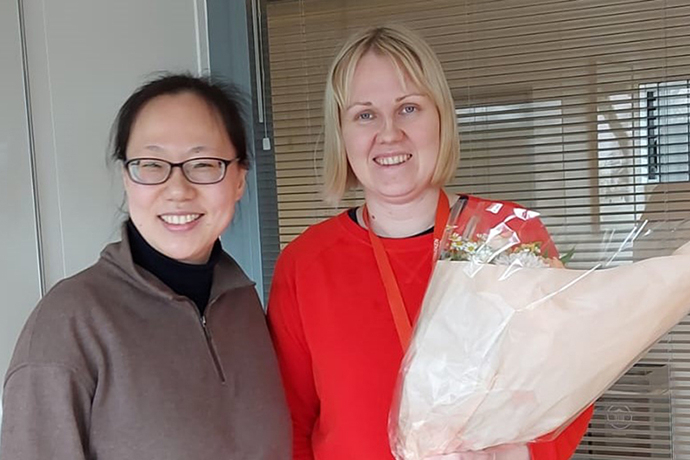Can you describe your PhD project - what were you trying to discover and what were the overall aims of the project?
After being harnessed as a tool for genome editing, the prokaryotic adaptive immune system - CRISPR (Clustered regularly interspaced short palindromic repeat) has revolutionized genetic research and redefined gene therapy. My PhD project focused on improving the precision editing efficiency of the CRISPR-Cas9 system by high-throughput methods. Precision editing is especially needed when applying CRISPR technology to correct mutations associated with genetic disorders. Thus, my overall aim was to try to identify novel strategies to enhance the accuracy of the system, and to develop a more efficient and effective CRISPR-Cas9 system that could be used for a variety of applications in basic and translational research. Specifically, we fused the gene editing nuclease Cas9 to about 450 DNA repair proteins and protein fragments to screen for fusions that improve precision editing outcomes, and further explore the potential mechanism of the fusions.
What were the main findings from your project and what is their significance to this area of research?
Comparing ~450 human DNA repair proteins and protein fragments in fusions with Cas9 for their efficiency in genome editing, we identified several fusions for improving the precision editing efficiency of the CRISPR-Cas9 system. Among them, the Cas9-POLD3 fusion performed best. The Cas9-POLD3 fusion enhances editing at the early time points by speeding up the kinetics of Cas9 DNA binding and dissociation, allowing the rapid initiation of DNA repair. This provides us with a new mechanism, and at the same time, it does not introduce any additional unwanted changes to the DNA compared with using wild-type Cas9. These findings have the potential to significantly improve the accuracy and efficiency of the system, making it a more useful tool for basic and translational research.
What have you most enjoyed about your project?
One of the things that I most enjoyed about my project was the opportunity to work with a cutting-edge technology like CRISPR-Cas9. This field is advancing rapidly, and it was exciting to be at the forefront of new developments and discoveries. I also enjoyed the challenge of problem-solving and finding innovative solutions to improve the precision editing efficiency of the system.
What motivates you to do your research?
What motivates me to do my research is the opportunity to make a real difference in people's lives. Knowing that my work has the potential of leading to the development of new treatments or diagnostic tools that could improve patient outcomes is incredibly rewarding and keeps me motivated to keep pushing forward.
How have you found being a PhD student at NCMM?
As an international PhD student at NCMM, I have found the experience to be incredibly rewarding. NCMM is home to a diverse and talented group of researchers from all over the world, providing a rich and stimulating research environment. The administrative staff at NCMM are also very supportive, providing assistance with everything from visa applications to conference travel arrangements, making starting the life as a PhD in an exotic country much easier. Overall, being a PhD student at NCMM has been a fantastic experience.
What are your plans for the future?
My plans for the future are to continue working in research and to apply the skills and knowledge that I gained during my PhD to new challenges and opportunities. I am excited about the potential for CRISPR-Cas9 and other genome editing technologies to transform medicine and improve human health, and I look forward to being a part of that progress. Whether that means pursuing a career in academia, industry, or elsewhere, I am confident that the skills and knowledge I gained during my PhD will serve me well in whatever I choose to do next.

